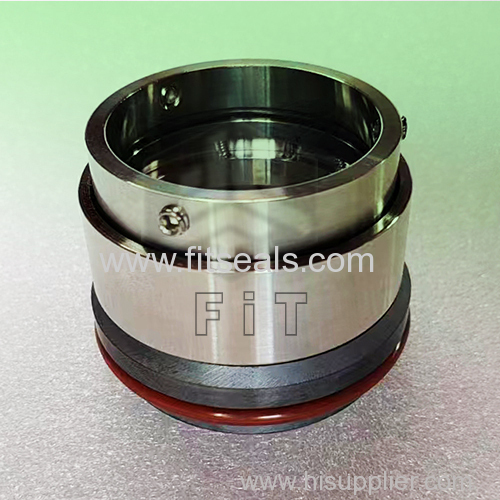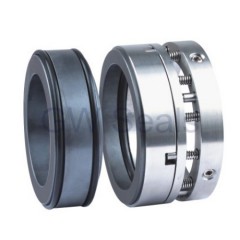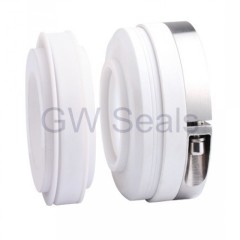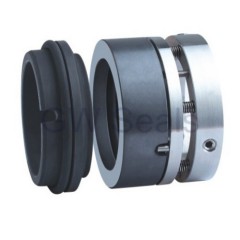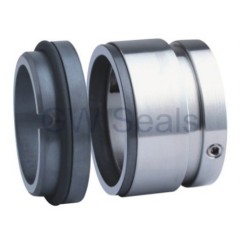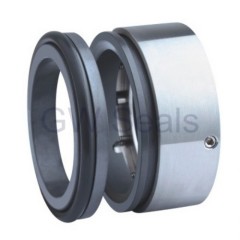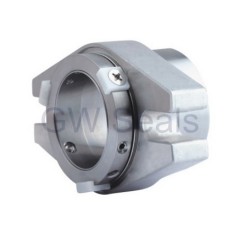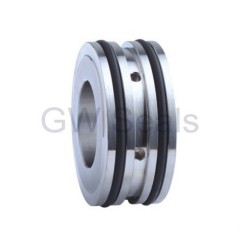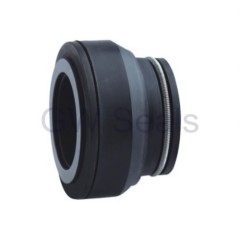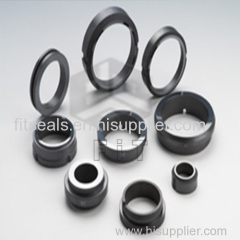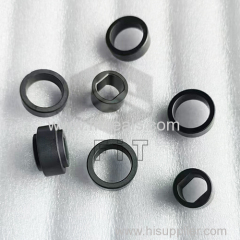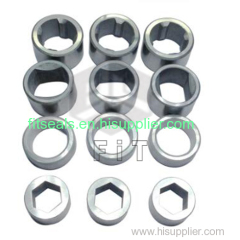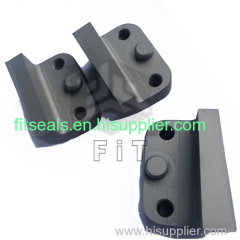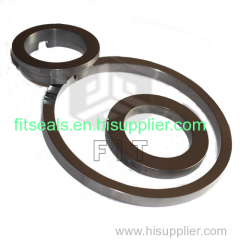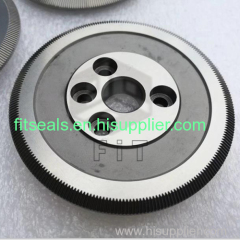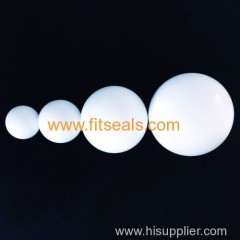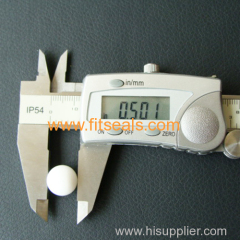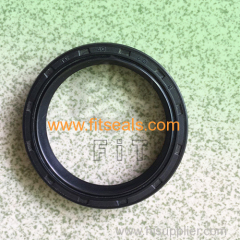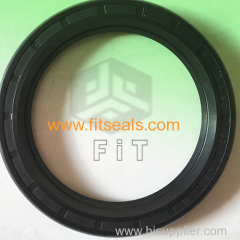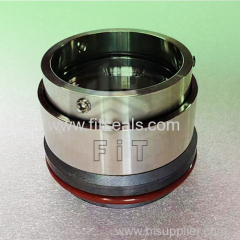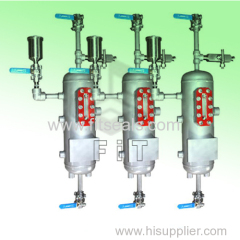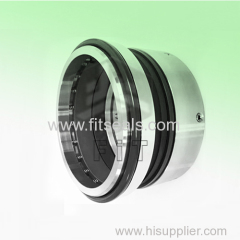
|
Ningbo FIT Pump Seals Factory
|
seal to replace AES .ROTEN EHS SEALS
| Price: | 55.0 USD |
| Payment Terms: | T/T,WU,Money Gram |
| Place of Origin: | Zhejiang, China (Mainland) |
|
|
|
| Add to My Favorites | |
| HiSupplier Escrow |
Product Detail
FTAESM Seal to suit general applications.
Also available in imperial sizes.
Alternative to:Burgmann HJ92N seal
Seal to suit general applications. Also available in imperial sizes.
Alternative to:Burgmann HJ92N seal
Roplan 201 seal
Roten EHS seal
Hecker HN 435 seal
Ropac Propac 50 seal


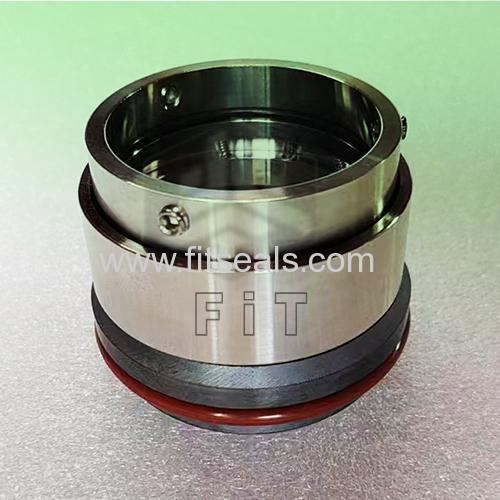

A mechanical seal is a very effective device. Every centrifugal pump must
accommodate a spinning shaft while mechanically maintaining fluid or gas contained
in the "wet end" of the pump. Mechanical seals consists primarily of a rotary
seal face with a driving mechanism which rotates at the same speed as the pump
shaft, a stationary seal face which mates with the rotary and is retained using a
gland or in some pump models an integral stuffing box cover, a tension assembly
(utillizing springs or a metal bellows) keeps the rotary face firmly positioned
against the stationary face preventing, excluding, and containing contamination and
leakage, both when the pump is not in operation and when the pump shaft is
rotating. Static sealing gaskets, orings or elastomeric bellows are strategically
located to complete the seal assembly.
We offer quality sealing and cost-effective mechanical seal designs that help keep
equipment running longer while reducing downtime. Through our comprehensive
selection we provide mechancial seals with short lead times and with a variety of
designs for use in many common and more challenging industry applications. When
selecting a mechanical seal, it is important to know what sort of design is needed,
and we have outlined a few of the more common elements below.
In-line Seals
In-line Seals simply refers to seals that are mounted to a shaft or sleeve but are
mounted independently as individual parts.
Single Spring Seals
Mechanical seal designs range from the work horse "single spring" mechanical seals,
to highly engineered double cartridge seals for extreme applications.
PTFE Seals
PTFE (polytetrafluoroethylene)or as most people know it Teflon ® , has a 0-14 ph
range it usually will hold up. Outside Seals
Outside Mechanical Seals can also be used in equipment with stuffing boxes which
will not accommodate inside seals, and they are easier to access for adjustment and
trouble-shooting.
Single Cartridge
A Single Cartridge Seal is a pre-assembled package of seal components making
installation much easier with fewer points for potential installation errors to
occur.
Metal Bellows Seals
Metal Bellows Seals for pumps - The most common are AM350 and Hastelloy C. Usually
with Stainless Steel end fittings permits these mechanical seals to be used for
services beyond the range of mechanical seals with synthetic rubber sealing
members.
Tandem Cartridge
There are two basic double seal arrangements: Tandem Cartridge and face-to-face. A
double cartridge mechanical seal can be configured in either configuration.
Double Cartridge
Double Cartridge Seals - Tandem Cartridge Seal is a pre-assembled package of seal
components making installation much easier with fewer points for potential
installation errors to occur.
Seal Pots
Mechanical Seal pumbing plans you will know in some cases you will need a Seal Pot
to supply clean lubricating fluid to your seal.
Mixer and Agitator Seals
Mixers and Agitators Seals offer a unique problem for mechanical seals. Because
most mixers or agitators are mounted on top or on the side of a vessel the long
shaft being used to mix or agitate usually has an issue with run out.
Mechanical Seals - Face Materials
Mechanical Seals come in a wide range of designs however the most important factor
when determining how long a seal is going to last, is deciding on the right seal
face materials. The old adage "pay me now or pay me later" applies to seals. You
must consider the environment the seal will be exposed to. Abrasive environments
require seal faces that will hold up to the wear and tear of abrasive environments.
It makes little sense to save money on the seal only to have to spend more money to
replace the seal later. On the other hand if you are pumping very clean fluid that
has a lubricating quality such as machine oil or Ethylene Glycol, save your money
for better quality bearings.
Seal Faces:
Ceramic - Generally a 99.5% aluminum oxide offering excellent wear characteristics
due to it's hardness. It is chemically inert and can be applied to nearly any
product. Ceramic cannot however handle the thermal shocks that Ni-resist or 17-4
seats can. They will also shatter like a plate if dropped on concrete.
Silicon Carbide - Is a bluish-black material created by fusing silica and carbon. It
is in the same family as Ceramic (due to the Silica), but has much better
lubrication qualities and is harder. The most common is reaction-bonded silicon
carbide. In Chemical applications however, Alpha Sintered Silicon Carbide may be
recommended. Alpha Sintered Silicon carbide does however sacrifice the Pressure
Velocity ratios due to the lack of un-reacted free carbon. Either grade of SIC can
usually be re-lapped and polished to be reused.
Tungsten Carbide - A very versatile seal face like Silicon Carbide. It is very hard
like silicon carbide however it is very heavy to the touch, making it easy to
distinguish from silicon carbide. Ideal for high pressure applications due to a
high modulus of elasticity which helps prevent face distortion. Tungsten carbide
also can be re-lapped and polished to be re-used.
Ni-resist - Is a form of Stainless steel which has had nickel added to it to lower
the friction generated by the rotating face. it is an inexpensive seal face and
ideal for fresh water applications.
GFPTFE - Say that one ten times.... Glass Filled PTFE (most people just say Teflon
(R)). Gives the chemical resistance of PTFE however glass must be added to give the
face hardness and to prevent cold flow issues associated with PTFE.

